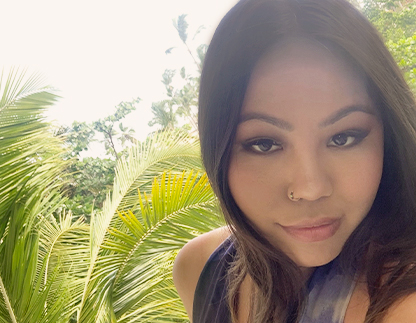I was lucky enough to be introduced to nanotechnology when I was in college, and that really changed the trajectory of my life and career.”
Alexa Wong (she/her)
PhD Candidate in the Department of Chemistry

Alexa Wong is a PhD candidate in the Department of Chemistry in the Weinberg College of Arts and Sciences. She conducts research on innovative nanolithography techniques for building biological arrays that involve instrument development, chemical/polymer synthesis, and data analysis.
How would you describe your research and/or work to a non-academic audience?
In the past, our research group has pioneered the use of DNA for nanoparticle assembly. I like to think of nanoparticles as LEGOS®, and we use DNA as glue to put them together to create a larger structure we call a “superlattice.” Because of the specificity of DNA interactions, we can program the identity of the nanoparticles in a superlattice. This is just like how we can put a blue LEGO next to a red LEGO, and again next to a blue LEGO, eventually creating a LEGO building.
In my research, I am trying to program superlattice interactions. Going back to the LEGO analogy, I am essentially using the LEGO buildings to make a LEGO city. The reason we would want to put nanoparticles together is because they can “communicate” with each other through plasmonic resonance and manipulate light. In my case, I am trying to achieve higher-order resonances by controlling synthesis of superlattice arrays so they have complex but functional interactions with light.
What have been some of the most memorable twists and turns of your career?
The biggest twist of my career was definitely deciding to get my PhD. I was educated in the New York City public school system and had very limited exposure to higher-level research. I was lucky enough to be introduced to nanotechnology when I was in college, and that really changed the trajectory of my life and career. Leaving home to come here for my PhD made me grow a lot as a person and a scientist. I’d say it’s a great plot twist.
What is a mistake you have learned from in your career?
I remember there was a 3-month period around the summer of my 2nd year when absolutely everything in the lab stopped working for me. I just kept trying again and again, week after week, and nothing worked. Finally, I was able to get my stuff working right before a research update with my PI Chad Mirkin. When I told him what happened that summer, he said, “If that happens again, my door is open.” I think sometimes we get so tunnel-visioned and forget to take a step back and ask for help. Hopefully, that’s a mistake I won’t make again.
How do you unwind after a long day?
I love to cook a nice meal after a long day. It really relaxes me.
What did you originally want to be when you grew up?
First, a furniture designer. Then later on a screenwriter
What advice would you give your younger self or someone considering a similar path?
Might as well try/ask, the worst they can say is no.
Published: August 22, 2023
If you know a graduate student, postdoctoral trainee, graduate faculty member, staff member, or a member of our TGS alumni population who would make a great candidate for our TGS Spotlight Series, please complete this brief TGS Spotlight Series Nomination Form.